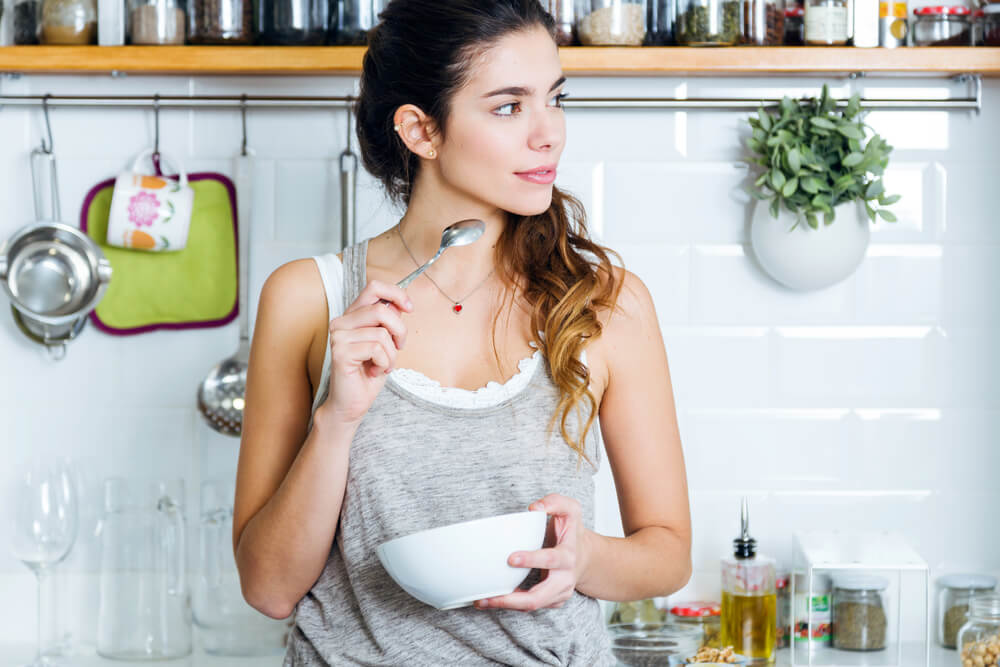Diet
10 Foods You Didn’t Know Were Good for Your Skin
The food that you eat has a direct impact on the health and appearance of your skin. From dryness to wrinkles to acne, most common skin concerns can be improved with just a few tweaks to a person’s diet.
Most people embarking upon dietary changes to improve their skin focus on adding more fruits and vegetables to their diet. This is definitely a step in the right direction – after all, fresh fruits and vegetables are loaded with skin-loving vitamins, minerals, and antioxidants.
However, while fruit and veg may be stealing the limelight, there are several other foods (and drinks) out there that can work wonders for your complexion. Read on to learn more about 10 foods that are surprisingly beneficial for the skin.
Green Tea
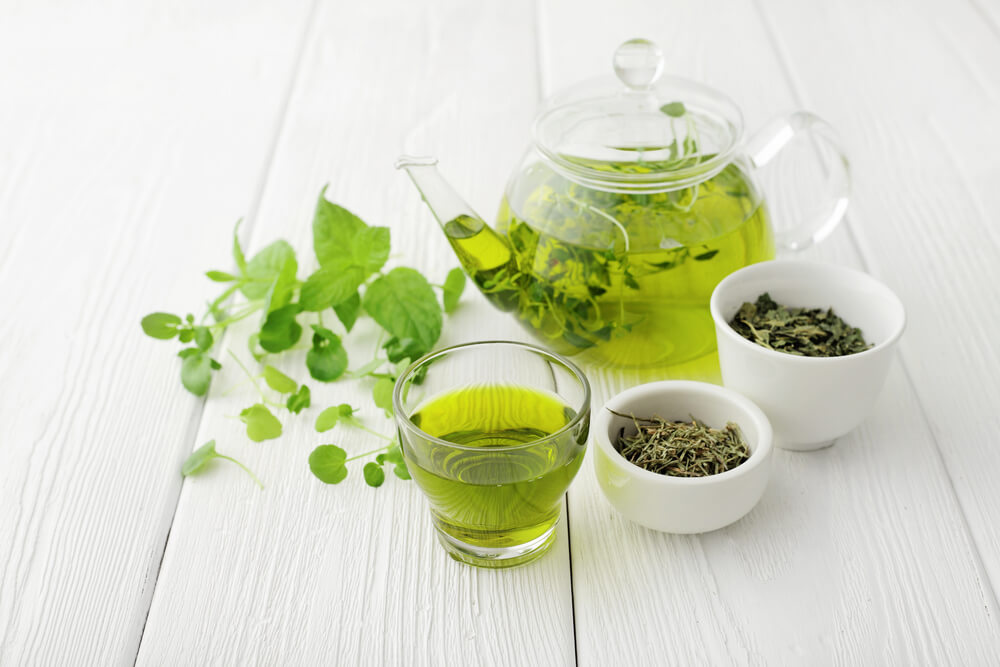
It’s no secret that green tea is good for our health. It boosts the brain, protects against disease, and so much more.
However, did you know that drinking green tea also benefits your skin in multiple ways?
It all comes down to the polyphenols and catechins in green tea. These are powerful antioxidant groups, meaning that they can:
- Prevent skin cancer
- Fight visible signs of aging
- Fade the look of discoloration
- Brighten a dull-looking complexion
- Calm the appearance of irritation and redness
You’ll need to drink about two cups of green tea a day in order to notice its beauty benefits.
For a double dose of all of those incredible properties, try incorporating green tea into your skincare routine too.
Oysters
Not everyone is a fan of the slippery texture that oysters are revered for. However, if oysters are a food that you enjoy eating, then you’ll be happy to know that this is something that your skin is loving too!
What’s so great about oysters?
They’re literally packed with zinc, more than any other food out there. You only need to eat three oysters for 100% of your recommended daily zinc intake.
Zinc is a nutrient that many are actually deficient in, but it’s a must for healthy-looking skin. Zinc plays a number of important roles when it comes to how your skin works, including:
- Essential in collagen and elastin production, which are the two main proteins that give your skin its structure, firmness, and smoothness
- Soothes the skin and calms any redness
- Regulates the skin’s sebum production, which helps to prevent acne breakouts
That’s not all…
In addition to zinc, oysters are also full of riboflavin and vitamin C. Both of these vitamins are key players in keeping your skin looking bright, smooth, and healthy.
What makes things even better is that oysters are low in calories but high in protein. This means that they’ll leave you feeling full and satisfied, without contributing to weight gain. Win-win!
Sunflower Seeds
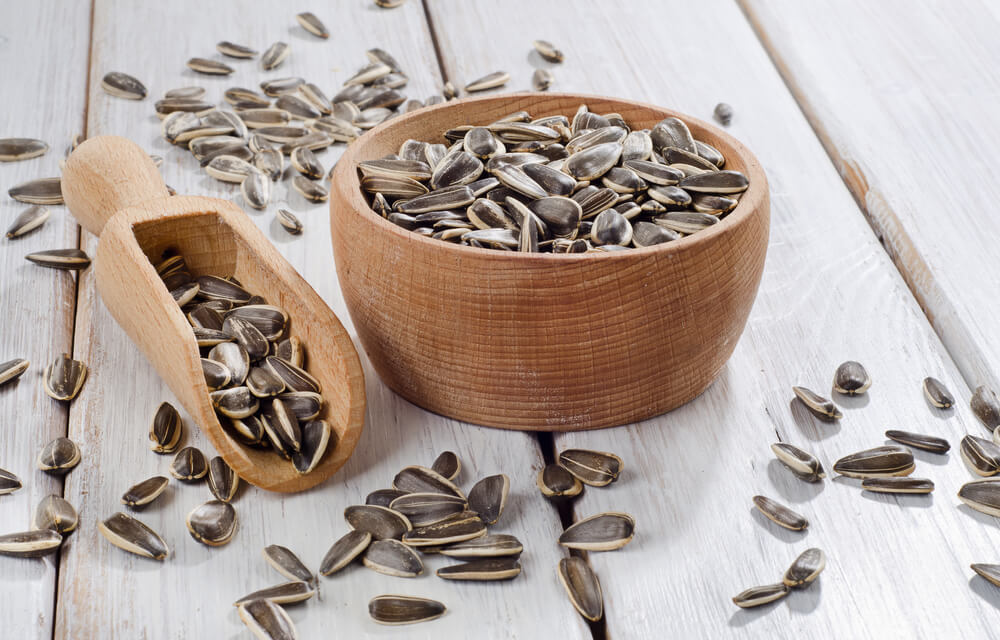
Just like oysters, sunflower seeds are also a fantastic source of zinc. However, they also contain high amounts of another very important vitamin…
Vitamin E is one that you’ve probably heard mentioned several times now. It has found its way into numerous skincare products, and for good reason too.
It’s an extremely powerful antioxidant that can actually reduce UV damage in the skin. Considering that UV damage is responsible for up to 80% of facial fine lines and wrinkles, this is huge!
Vitamin E is also vital for strengthening the skin’s natural protective barrier. This then allows the skin to better defend itself against damage in the future.
Not a fan of snacking on raw sunflower seeds?
Other ways to add them to your diet include:
- Roasting and lightly salting them
- Baking them into muffins and cakes
- Adding them to salads
Kefir
Have you heard of kefir before?
It’s a probiotic drink that’s being increasingly seen on store shelves. However, it’s not a fad – kefir has been around for centuries.
It’s made by fermenting milk, giving you a yogurt-like drink that’s absolutely packed with probiotics.
What does this have to do with your skin?
Probiotics are able to help with such a wide range of skin conditions. Experts believe that this is down to the way in which probiotics heal and strengthen the gut. This then means that all of the nutrients from the food that you eat can be better absorbed, allowing your skin to receive its fair share.
Probiotics also have a powerful anti-inflammatory effect. Everything from acne to rosacea can be treated with probiotics.
If kefir isn’t your thing, try adding some other probiotic-rich foods to your diet instead, such as:
- Kimchi
- Miso
- Yogurt
- Sauerkraut
- Sourdough bread
Salmon
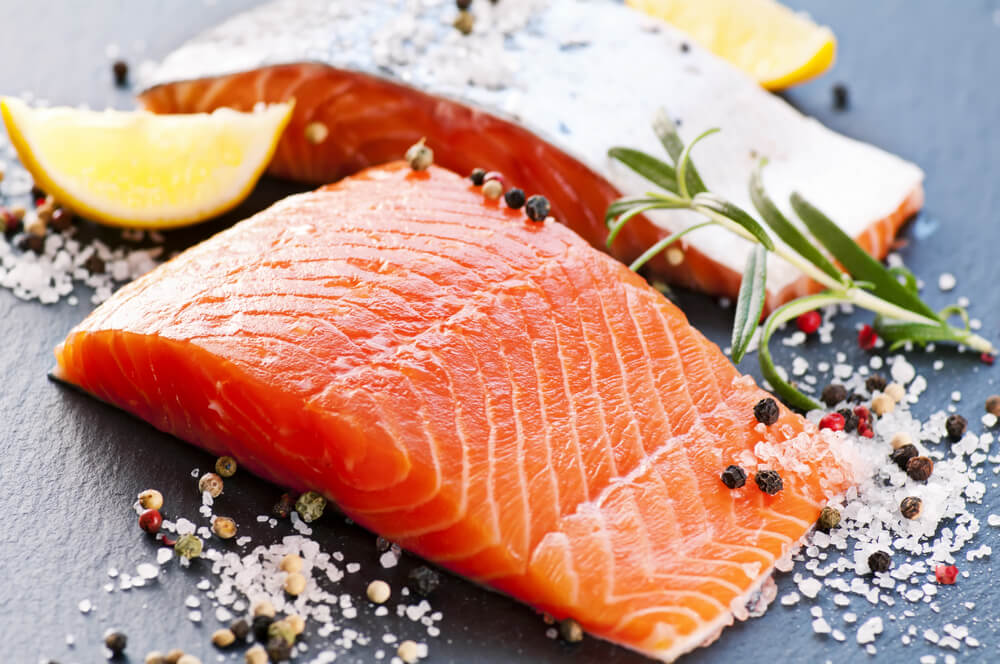
Whether you love it or hate it, your skin is begging you to eat more salmon.
Why?
Because it’s one of the best sources of omega-3 fatty acids. This natural oil performs a number of functions, such as:
- Repairing and strengthening your skin’s natural protective barrier
- Retaining moisture in the skin
- Reducing inflammation
- Aiding in the production of collagen and elastin
Salmon is also a fantastic source of vitamin D. This is a vitamin that you don’t hear much about, but it boasts photoprotective properties. This means that it can protect the skin from sun damage.
Another compound that helps with all of this is astaxanthin. This is the carotenoid that gives salmon its distinctive pink hue. It also happens to have anti-inflammatory and antioxidant properties, making it no surprise that salmon is a fish that your skin loves!
So, how often should you be eating salmon for maximum skin benefits?
Aim for one serving three times a week. More often than this would be even better, but people then tend to get sick of it, cutting it out of their diet completely. As with everything, moderation is key!
If you’re looking for some new and exciting ways to cook salmon, give these a try:
- Honey garlic glazed salmon
- Baked in foil with some lemon and herbs
- Grilled with lemon
- Coconut lime salmon
- Pan-fried salmon steaks
One more thing to keep in mind…
Always buy and eat salmon with its skin on! The skin contains the highest concentration of omega-3 fatty acids in salmon. Throwing the skin out would mean that you’re throwing out the majority of the fish’s goodness, so make sure that you keep that skin on! Plus, when cooked correctly, the skin can end up being one of the most delicious parts of the fish too.
Dark Chocolate
You probably weren’t expecting to see chocolate on this list.
However, not all chocolate is good for your skin. It needs to be dark, meaning a cocoa content of at least 70%.
Why?
Because dark chocolate is extremely rich in specific skin-enhancing nutrients, such as:
- Vitamins A, B1, C, D, E
- Iron
- Magnesium
- Copper
- Manganese
- Antioxidants (dark chocolate actually has more antioxidant activity than any fruit out there, including acai and blueberries)
This gives dark chocolate the ability to do everything from the fight the onset of wrinkles to protect from damaging UV rays.
Of course, unlike many of the other foods on this list, there’s a downside to dark chocolate…
Yes, it’s rich in nutrients, but it’s also high in calories. For this reason, restrict yourself to between 30g and 60g of dark chocolate a day.
Natto
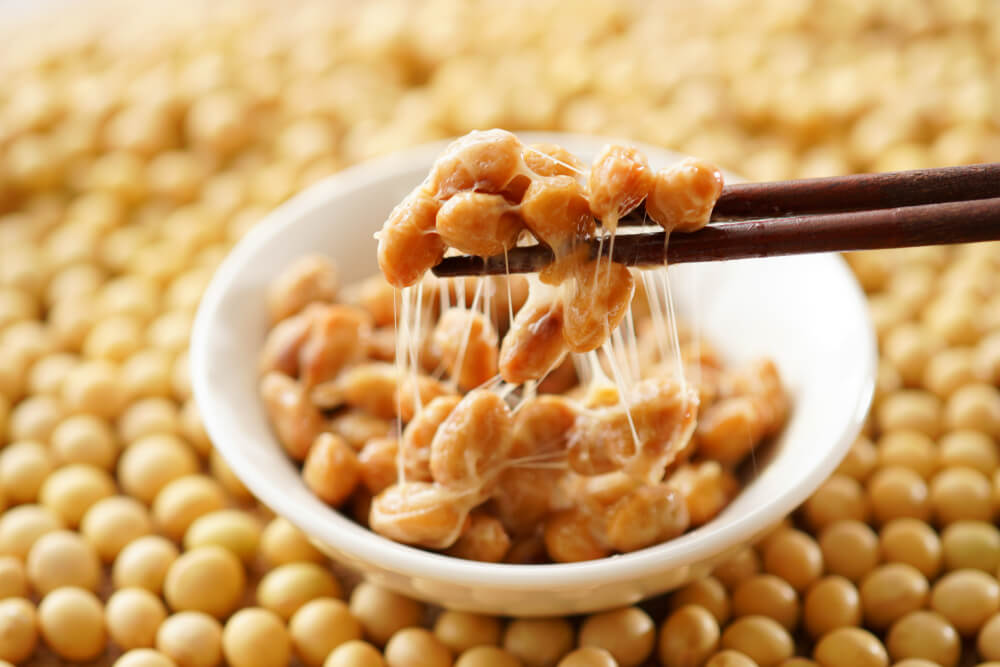
If you’re not familiar with Japanese cuisine, then you may not have heard of natto before. It’s made from fermented soybeans and is commonly served in the mornings for breakfast.
What does it taste like?
That depends on who you ask…
Some would say it tastes a little like an earthy form of bacon, while others would say foie gras or salted cottage cheese.
Either way, its flavor and texture make it unique enough to warrant trying, especially when you consider the fact that it brings a whole host of skin benefits with it too!
If natto is new to you, then you’ve probably not heard of pyrroloquinoline quinone before. Otherwise known as PQQ, this small molecule was once considered to be a vitamin. Today, it’s referred to as an antioxidant, largely due to the way in which it protects the cells in the body from oxidative stress.
PQQ also helps to promote growth in the body. When it comes to the skin, this means an increased production of new skin cells, giving your skin that smooth and soft glow you’ve been seeking.
Want to give natto a try but don’t know where to buy it from?
Homemade versions are always so much better! There are plenty of guides out there that will teach you how to ferment soybeans to create your very own natto.
Turmeric
Turmeric has been in the headlines quite a bit lately. More and more studies have been emerging that confirm the many benefits that turmeric brings.
If you don’t cook with this bright yellow spice, now is the time to start. Not only is turmeric a powerhouse for your general health, but it will work magic on your skin too.
The main reason why turmeric is so revered is because of a compound called curcumin. Curcumin has extremely powerful anti-inflammatory properties that are able to help the skin in so many ways.
Inflammation alone is responsible for numerous skin concerns, from acne to psoriasis to aging. Reducing inflammation is the secret to keeping your skin at its best, and turmeric is something that can help you to do that.
Don’t cook with turmeric much?
This spice is commonly added to curries, but it’s surprisingly versatile. Try using it one of the following ways:
- Adding it to a soup or stew
- Blending it into a smoothie
- Brewing it into a tea with lemon and honey
- Adding it to hummus and other dips
Eggs
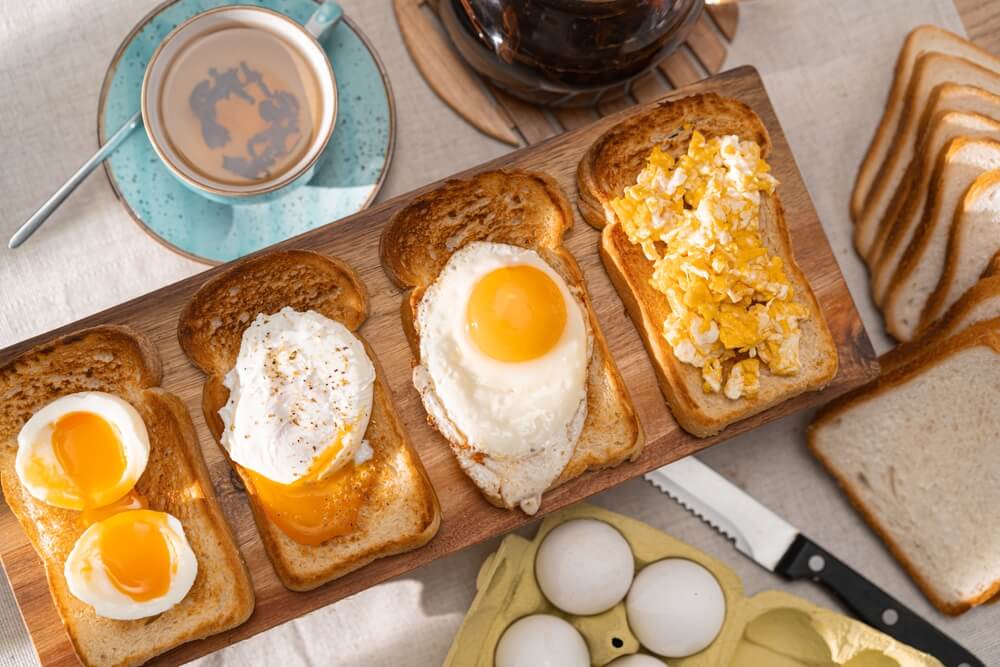
Just about everyone is familiar with eggs. They’re a popular breakfast food, but are versatile enough to be eaten at all times of the day.
Eggs are known for being extremely nutrient-dense, and that’s something that benefits both your body and your skin.
There are a number of key compounds that you’ll find in eggs, including:
- Protein
- Amino acids
- Vitamin A
- Lutein
- Iron
- Selenium
Don’t eat eggs very often?
It’s time to change that!
Try experimenting with new and exciting ways to cook eggs. From poached scrambled eggs to sheet pan frittatas, eggs allow you to get surprisingly creative in the kitchen, and it won’t be long before you fall back in love with them!
Oats
Another popular breakfast food, oats are an incredibly nutritious grain. Due to how nutritious they are, oats are considered to be a natural superfood.
As you can imagine, your skin really benefits from the high nutrient content of oats. However, there’s one nutrient in particular that you need to know more about…
Beta-glucan is a form of soluble dietary fiber. It can be found in high amounts in oats. Recent research has found beta-glucan to be transformational when it comes to treating certain skin conditions, especially eczema and skin wounds.
Beta-glucan, as well as many of the other compounds in oats, is known for its soothing and calming properties.
At the same time, it will help to enhance and strengthen your immune system, which also plays an important role in keeping your skin healthy.
Are oats not a part of your diet?
Overnight oats are a great way to start the day, as is baked oatmeal or breakfast cookies. Alternatively, mix up some homemade granola to snack on throughout the day, or whip up some oats into a filling and satisfying smoothie.
Conclusion
It’s easy to focus on fruits and vegetables when it comes to trying to eat healthier. While these definitely do make a huge difference to the skin, there’s so much else out there too! From eggs and oysters to oats and natto, understanding the different benefits that each antioxidant food that you eat brings to your skin is always a good idea. This way, you can ensure that you balance your diet in a way that guarantees plenty of skin-boosting nutrients.



